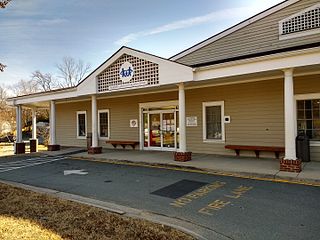Related Research Articles

An orphanage is a residential institution, total institution or group home, devoted to the care of orphans and children who, for various reasons, cannot be cared for by their biological families. The parents may be deceased, absent, or abusive. There may be substance abuse or mental illness in the biological home, or the parent may simply be unwilling to care for the child. The legal responsibility for the support of abandoned children differs from country to country, and within countries. Government-run orphanages have been phased out in most developed countries during the latter half of the 20th century but continue to operate in many other regions internationally. It is now generally accepted that orphanages are detrimental to the emotional wellbeing of children, and government support goes instead towards supporting the family unit.

The Mata Amritanandamayi Math (MAM) is an international charitable organization aimed at the spiritual and material upliftment of humankind. It was founded by Indian spiritual leader and humanitarian Mata Amritanandamayi in 1981, with its headquarters in Paryakadavu, Alappad Panchayat, Kollam district, Kerala. Along with its sister organization, the Mata Amritanandamayi Mission Trust, MAM conducts charitable work including disaster relief, healthcare for the poor, environmental programs, fighting hunger and scholarships for impoverished students, amongst others. It also runs the seven-campus university known as Amrita Vishwa Vidyapeetham, 90 chain of English medium CBSE schools known as Amrita Vidyalayam, and classes in yoga, meditation and Sanskrit.

The Student Health Action Coalition (SHAC) at the University of North Carolina at Chapel Hill (UNC) is the oldest student-run free clinic in the United States. It is run entirely by student volunteers from the Schools of Social Work, Public Health, Physical Therapy, Pharmacy, Nursing, Medicine, and Dentistry. The students, under the supervision of UNC doctors and professors, combine their skills to hold weekly dental and health clinics, provide rapid HIV testing services, and create sustainable community health promotion programs.
Project Mercy, Inc. is a Christian, non profit organization located in Yetebon, Ethiopia, founded in 1977 by Marta Gabre-Tsadick and Deme Tekle-Wold. Over the past 18 years, Project Mercy's original mission has been expanded to include community development and self-help programs.

Raising Malawi is a charity non-profit organization that was founded by Madonna and Michael Berg in 2006. It is dedicated to helping with the extreme poverty and hardship endured by Malawi's one million orphans, primarily through health and education programming. Initially, the "Raising Malawi Academy for Girls" was to be constructed but following an audit by the Global Philanthropy Group, which questioned expenditure on salaries and benefits as well as the management capacity and culture, the charity's school headmistress resigned in October 2010 and the project was scrapped.
Young Heroes is a charity, based in Mbabane, Swaziland. With a focus on orphaned and vulnerable children and their elderly caretakers, Young Heroes directly addresses the HIV/AIDS epidemic in Swaziland — the nation with the world’s highest rate of infection — on three fronts: education and prevention; healthcare; and impact mitigation/poverty reduction.
CYMA - Canadian Youth Mission to Armenia - is a volunteer-run humanitarian and student exchange program in support of Armenia created by Archbishop Hovnan Derderian and Ronald Alepian.

The United States established diplomatic relations with Malawi in 1964 after Malawi gained independence from the United Kingdom. Malawi's transition from a one-party state to a multi-party democracy significantly strengthened the already cordial U.S. relationship with Malawi. Significant numbers of Malawians study in the United States. The United States has an active Peace Corps program, Centers for Disease Control and Prevention, Department of Health and Human Services, and an Agency for International Development (USAID) mission in Malawi. Both countries have a common history and English language, as they were part of the British Empire.

Eswatini–United States relations are bilateral relations between Eswatini and the United States.

As of 2012, approximately 1,100,000 people in Malawi are HIV-positive, which represents 10.8% of the country's population. Because the Malawian government was initially slow to respond to the epidemic under the leadership of Hastings Banda (1966–1994), the prevalence of HIV/AIDS increased drastically between 1985, when the disease was first identified in Malawi, and 1993, when HIV prevalence rates were estimated to be as high as 30% among pregnant women. The Malawian food crisis in 2002 resulted, at least in part, from a loss of agricultural productivity due to the prevalence of HIV/AIDS. Various degrees of government involvement under the leadership of Bakili Muluzi (1994–2004) and Bingu wa Mutharika (2004–2012) resulted in a gradual decline in HIV prevalence, and, in 2003, many people living in Malawi gained access to antiretroviral therapy. Condoms have become more widely available to the public through non-governmental organizations, and more Malawians are taking advantage of HIV testing services.
Consol Homes is a Malawi community organisation that supports orphans and young children affected by HIV and AIDs.
Openmind Projects (OMP), in Nong Khai Province, Thailand is a developmental aid organisation focused on helping communities in Thailand, Laos, Cambodia, and Nepal through the creation and management of grass roots projects in the areas of e-learning, education, and environment. The focus of the organisation is using information and communication technologies (ICT) to educate individuals in schools, orphanages, national parks, and villages. Projects rely on volunteers to promote changes in local communities.
Starfish Greathearts Foundation is an international non-governmental organization formed in 2001 to help orphaned and vulnerable children in South Africa. Its mission is to help make a difference in the lives of such children via community-based projects working at grassroots level. This enables individual communities to develop their own solutions to fight the challenges they come across. As of January 2022, Starfish projects have reached more than 220,000 children in 110 communities across South Africa.</ref> Starfish Greathearts Foundation.
The Uganda AIDS Orphan Children Foundation (UAOCF) is a non-profit charity that helps vulnerable children and those orphaned by AIDS in Uganda. UAOCF received 501 (c) (3) charity status in 2003; subsequently, the Internal Revenue Service granted permanent public charity status in 2006. The foundation's mission is to provide support to orphans in foster homes and to support Hope House, the Kabale Diocese residential facility/technical school for orphans. As of April 2009, UAOCF supports over 50 children at Hope House and over 350 all together.
Uganda Rural Fund (URF) is a grassroots non-governmental organization working in Southwestern Uganda, primarily in the Masaka and Rakai Districts. URF states that its mission is to “to empower orphans, impoverished youth, and women to fight poverty in Uganda’s rural communities, through the creation of educational and sustainable development opportunities.” URF attempts to give community members the tools and resources to better their own lives and the lives of those around them.
The Naz Foundation (India) Trust is a non-governmental organisation (NGO) in that country that works on HIV/AIDS and sexual health. It is based in the Indian capital of New Delhi.
Citizen Schools is an American nonprofit organization that partners with middle schools across the United States to expand the learning day for children in low-income communities. Its stated mission is "educating children and strengthening communities". Currently, Citizen Schools serves over 5,000 students and recruits over 4,280 volunteers over 31 program sites in 13 cities across 7 states. The center pieces of the Citizen Schools model are its apprenticeship programs run by volunteers that culminate in public demonstrations called WOW!s, and partnering with some middle schools to expand learning time for students. Citizen Schools offers the AmeriCorps National Teaching Fellowship providing a 2-year paid service opportunity for citizens interested in using their personal talents to enhance life opportunities for middle school students. Fellows in their second year can participate in a residency program operated by one of three university partners to obtain teacher certification in California, Massachusetts and New York. In honor of its 20 anniversary in 2015, Citizen Schools honored 20 alumni of the Fellowship who continue to make a profound impact in the community today.
Founded in 1983, AIDS Vancouver (AV) is a non-profit and community-based health organization whose mission is to alleviate collective vulnerability to HIV and AIDS through support, public education and community-based research. The organization exists to both ameliorate the life of persons living with HIV and AIDS, and to prevent the spread of HIV by educational initiatives. Based in Vancouver, it is Canada's oldest and Vancouver's largest HIV and AIDS service organization.
Africa's Children-Africa's Future (AC-AF) was founded in 2006 and was recognized as a registered charity in 2009. The organization conducted programming in Canada and Tanzania to encourage the empowerment of children and youth in response to the various challenges posed by the AIDS pandemic. AC-AF's programming offered grassroots responses and sustainable solutions to build, strengthen and support community resources. Due to significant reforms in funding opportunities, the organization was forced to close its doors in 2014.

Green Crescent Trust (GCT) is a non-profit organization in Sindh, Pakistan that focuses on education and development. It was established in 1995 by group of people with just one goal: making a better Pakistan through education. It started out with just one school and handful of students in Karachi.